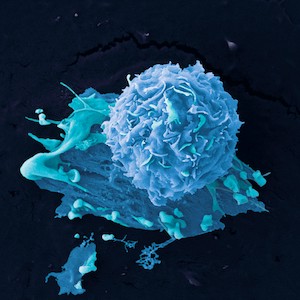Immunotherapy News

|
Study provides guidance on immunotherapy-related, chronic skin reactions Some cancer patients experience durable remissions from immune checkpoint inhibitors that spur their T cells to attack cancer cells, but these immunotherapies can also cause reactions. One of the adverse effects of these treatments is skin reactions known as cutaneous immune-related adverse events (cirAEs), although it is not known how often they morph into a chronic condition. Research led by investigators at Vanderbilt University Medical Center published in JAMA Dermatology provides insight into chronic cirAEs. They recommended long-term follow-up for patients by dermatologists familiar with cirAEs and consideration of corticosteroid-sparing treatment options. “Understanding the potential for side effects to become long-lasting has been an important advance recently, and managing them more effectively is a key unmet need,” said the study’s corresponding author, Douglas Johnson, MD, MSCI, professor of Medicine, holder of the Susan and Luke Simons Directorship, and co-leader of the Translational Research and Interventional Oncology Research Program at Vanderbilt-Ingram Cancer Center. The investigators reviewed the records of 318 patients from a previous study who had been treated with immune checkpoint inhibitors. Of that number, 100 or 31% developed cirAEs with the skin conditions becoming chronic for 24 of the patients — nearly 8% of the full cohort. The study looked at 21 of those patients who underwent detailed follow-up. Another 31 patients were added from Vanderbilt clinics who were treated for cirAEs. The 52 patients had received either pembrolizumab, nivolumab, ipilimumab or anti-PD1 and CTLA4 combination therapy. The types of skin reactions varied, with 15 experiencing pruritus or itchy skin, 12 experienced morbilliform eruptions or drug-induced skin rashes, 12 experienced dermatitis or inflamed and scaly rashes, eight experienced bullous pemphigoid-like eruptions (fluid-filled blisters that resemble a rare autoimmune skin disease), five experienced eczema, four experienced lichenoid (flat-topped, scaly lesions), two experienced psoriasiform (breakouts that resemble psoriasis), and one experienced acneiform or acne-like eruptions. The median duration of cirAE from treatment cessation was 446 days. Rare cases lasted more than five years. Other Vanderbilt authors on the study included the study’s lead author, Kylie Fletcher, BS, Rachel Goodman, MD, MBA, J. Randall Patrinely, MD, MBA, and Anna Dewan, MD, MHS. The research received support from Medical Scholars at Vanderbilt University School of Medicine, the Susan and Luke Simons Directorship, the James C. Bradford Jr. Fund in Melanoma Cancer Research and the Van Stephenson Memorial Cancer Research Fund. The post Study provides guidance on immunotherapy-related, chronic skin reactions appeared first on VUMC News. Thursday, April 10th, 2025 |

|
Obesity-cancer connection discovery suggests strategies for improving immunotherapy The study reported in the journal Nature provides a mechanistic explanation for the obesity paradox that obesity can contribute to cancer progression but also improve response to immunotherapy. Thursday, June 13th, 2024 |

|
Tumor antigens key to improving cancer immunotherapy study Vanderbilt researchers are working to better design immune therapies that attack tumors without also attacking healthy normal tissue in patients. Friday, November 17th, 2023 |

|
Project seeks new way to assess immunotherapy effectiveness GE Healthcare has awarded researchers $2.5 million in funding to develop PET tracer that will determine the effectiveness of immunotherapy in patients early in their treatment course. Thursday, November 7th, 2019 |

|
New prostate cancer treatment concept Combining immunotherapy and radiation therapy may be a powerful treatment approach for castration-resistant prostate cancer. Friday, August 30th, 2019 |

|
Encephalitis identified as rare toxicity of immunotherapy treatment Researchers are chronicling rare but serious toxicities that may occur with immune checkpoint inhibitors, the most widely prescribed class of immunotherapies. Monday, July 22nd, 2019 |

|
Breast cancer-killing RIG A recent study in the journal Cancer Research demonstrates that a RIG-I agonist has potent immunogenic and therapeutic effects in breast cancer. Friday, December 14th, 2018 |

|
Combination therapy improves small-cell lung cancer survival Patients who received atezolizumab in addition to standard chemotherapy lived two months longer than those treated with chemotherapy alone, according to a recent study published in the New England Journal of Medicine. Friday, October 26th, 2018 |

|
Study to test combination therapy for breast cancer Vanderbilt-Ingram Cancer Center has received $2.3 million to fund a clinical research trial testing a combination of three immunotherapy compounds for patients with a specific type of advanced breast cancer. Friday, October 27th, 2017 |

|
V Foundation grants bolster cancer initiatives Two Vanderbilt-Ingram Cancer Center (VICC) investigators have earned grant awards from The V Foundation for Cancer Research, continuing the foundation’s support for innovative cancer research initiatives at VICC. Raymond Blind, Ph.D. Thursday, November 17th, 2016 |

|
Study details rare heart risk of certain cancer therapies Combination therapy using two approved immunotherapy drugs for cancer treatment may cause rare and sometimes fatal cardiac side effects linked to an unexpected immune response. In a study led by Vanderbilt University Medical Center (VUMC) investigators and published in the Nov. 3 issue of the New England Journal of Medicine, researchers describe two cases of […] Monday, November 7th, 2016 |

|
VICC treats first patient in Tennessee with novel cellular immunotherapy For the first time, Vanderbilt-Ingram Cancer Center (VICC) investigators have used a cancer patient’s own re-engineered immune cells to treat a form of blood cancer by stimulating the immune system. The new CAR-T investigational therapy (known as KTE-C19) is being studied in a clinical trial for patients with aggressive non-Hodgkin Lymphoma (NHL). The trial, called […] Monday, February 29th, 2016 |


